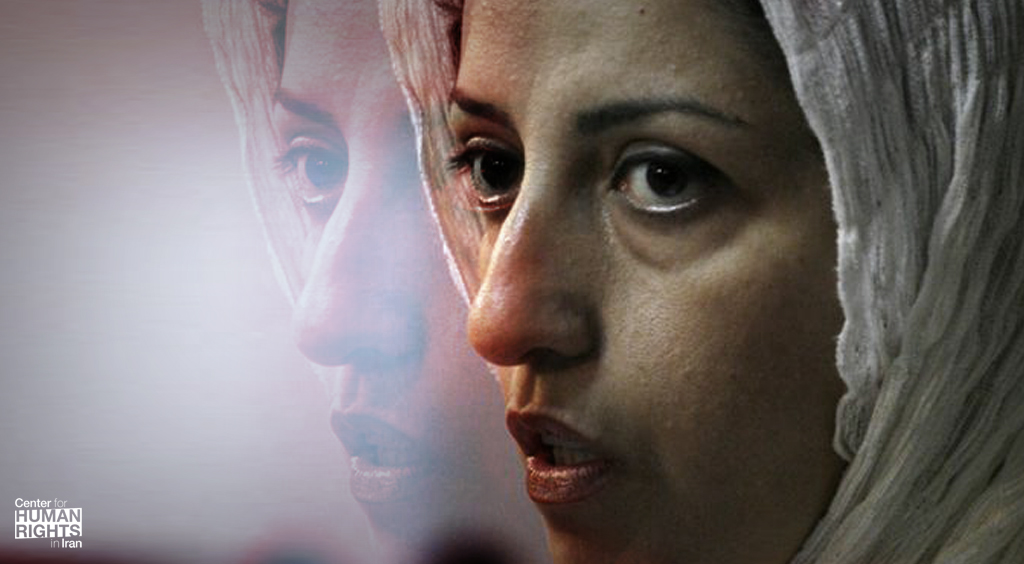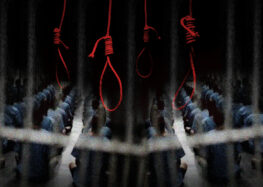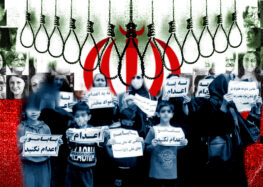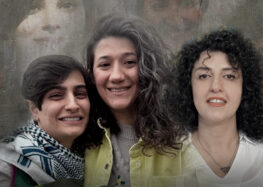Narges Mohammadi’s Letter from Prison: “The lives of people on death row are in danger”

“The regime…knows no legal, logical or religious bounds in denying the rights of dissidents”
Prominent human rights activist Narges Mohammadi, imprisoned in Iran since 2015 for her peaceful defense of civil and political liberties, has written an impassioned letter from prison in which she speaks out against “not only the killing of protesters in the streets in recent years, but also the execution of young protesters.”
Writing from her cell, Mohammadi speaks of the “horrific intolerable restrictions and assaults” she has been subjected to at Zanjan Prison where she is serving a 16-year sentence for her peaceful human rights advocacy, 10 years of which she must serve before becoming eligible for parole, and states: “These increasing restrictions carry the regime’s clear message that it knows no legal, logical or religious bounds in denying the rights of dissidents.”
In a reference to the recent executions of participants in protests that have roiled the country over the last few years, she calls “upon all freedom fighters in the world for help” and asks “Let’s unite in voicing our opposition to the death penalty. The lives of people on death row are in danger. Yesterday it was someone else’s child, today it’s mine, tomorrow it will be yours.”
In 2016, Mohammadi was sentenced to 16 years’ imprisonment for “membership in the [now banned] Step by Step to Stop the Death Penalty” group; “taking part in assembly and collusion against national security” and “committing propaganda against the state.”
In late December 2019, following her participation in a peaceful protest in Evin prison against the killing of protestors by state security forces in November 2019, Mohammadi was forcibly and violently exiled to Zanjan prison, some 300 km from Tehran.
The former Deputy Director of the Defenders of Human Rights Centre (DHRC), Mohammadi was awarded the Per Anger Prize by the Swedish government for her human rights work in 2011 and the Andrei Sakharov Prize from the American Physical Society in 2018.
Following is Narges Mohammadi’s letter in full from Zanjan Prison, dated September 18, 2020, which was published by the Defenders of Human Rights Center on September 21, 2020.
During the years in prison, when my cellmates go to sleep, I’ve had a habit of opening my worship mat and doing a short prayer.
Last night after the lights were turned off, I opened my worship mat and sat down. Suddenly the lights in the ward came back on and the warden shouted on the speakerphone: “Get up and collect your worship map!”
The repeated turning of the lights off and on woke up my cellmates and so I had to fold my worship mat and go to the toilet and spread it on the wet mosaic floor to continue my prayer.
This morning I told the prison authorities that from now on I will spread my worship mat on the toilet floor which surely is cleaner than the perfumed altars tyrants pray under.
To me, a woman behind bars is cleaner than a free woman who treats members of her own gender with brutality.
If this is an order against me from higher authorities, it will be hard to take. However, it’s necessary to experience this fact that authoritarian religious regimes consider it their business to interfere in people’s most personal inner affairs in order to show their strength and domination.
I’m reminded of my leftist sisters in prison in the 1980’s when they were flogged five lashes every time they avoided the occasion for prayer.
The point isn’t about who believes in what. The point is that while authoritarianism diminishes human dignity, religious tyrants on the other hand act much more brazenly than any kind of authoritarian system.
After enduring years of imprisonment, I have to be humiliated and insulted by the authorities who are now denying me the right to sit on a worship mat.
These increasing restrictions carry the regime’s clear message that it knows no legal, logical or religious bounds in denying the rights of dissidents who will suffer ever more until they die, break or repent.
After the sit-down strike in Evin Prison in December 2019, which was in protest against the executions of young people demanding an end to poverty and unemployment caused by political repression, I was subjected to horrific intolerable restrictions and assaults.
I have no intention of raising the issue of my personal rights, but I am more determined to raise the people’s demands.
At this time, I protest not only the killing of protesters in the streets in recent years, but also the execution of young protesters, as well as the regime’s machinations.
We call upon all freedom fighters in the world for help.
I call on all suffering mothers of my country not to sit and watch more gallows being erected or else it will be too late to save our defenseless youth.
Let’s unite in voicing our opposition to the death penalty. The lives of people on death row are in danger. Yesterday it was someone else’s child, today it’s mine, tomorrow it will be yours.
Narges Mohammadi
Zanjan Prison
September 18, 2020






